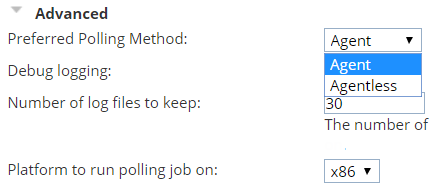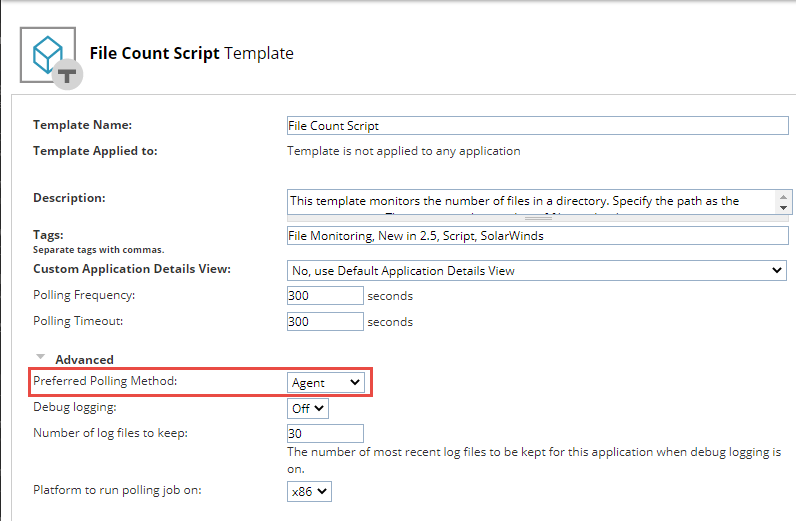Monitor with SolarWinds Platform agents in SAM
An SolarWinds Platform agent is software that provides a communication channel between the SolarWinds Platform server and Windows, Linux/Unix, or AIX systems, as an alternative to WMI or SNMP to gather status and metrics about your key devices, applications, and services. SolarWinds Platform agents can be useful in environments where conventional agentless monitoring techniques are either impractical or impossible to leverage, such as in these scenarios:
- Monitoring Windows hosts within a DMZ over a single fixed port,
- Monitoring servers in remote branch offices over high latency, low bandwidth connections, or
- Monitoring servers hosted in cloud-based services, such as AWS EC2, Azure, or Rackspace.
Some benefits of using SolarWinds Platform agents for SAM polling include:
-
Encryption: Neither standard SNMP nor WMI include encryption.
-
Speed: Agentless protocols such as WMI and RPC were originally created for LANs, not the Internet. SolarWinds Platform agents use HTTPS, which is bandwidth-efficient and latency-friendly.
-
Reliability: Agents run independently of the SolarWinds Platform server and can monitor hosts even if a network outage occurs. For up to 24 hours, an agent can continue running and all polled data remains cached on the agent. When connectivity is restored, the agent uploads collected statistics to the SolarWinds Platform server, filling in gaps in charts.
-
Flexibility: With agents, you can run Perl, VBScript, and any other Windows script language remotely using a Windows Script Monitor. Otherwise, all Windows Script Monitors execute locally on the Main Polling Engine or an APE; an agent allows you to execute scripts on the system where the agent is installed.
-
Fewer ports: WMI requires several open ports to function properly but SolarWinds Platform agents can use "Server Initiated" mode to operate over a single port. TCP port 17790 listens on the host where the agent is installed while the SolarWinds Platform server polls information in a similar fashion to SNMP or RPC. No ports need to be opened inbound to the internal network from the DMZ, and all communication occurs across a single NAT-friendly port.
-
Cloud-friendly: Monitoring cloud-based applications and servers using traditional agentless protocols presents many issues. In addition to the encryption and port issues mentioned above, WMI cannot traverse NAT boundaries and its frequent communication doesn't tolerate bandwidth congestion or high latency conditions well. Also, many ISPs block RPC traffic to guard against hackers.
To effectively monitor Linux/Unix systems with the SolarWinds Platform agent for Linux, additional configuration may be required. See Configure Linux/Unix systems for the SolarWinds Platform agent for Linux and Configure SNMP for SolarWinds Platform agents on Linux/Unix and AIX systems in SAM.
Additional resources about agents include:
- Installing the SolarWinds Platform Agent (video)
- Mass deploy Windows agents using MST files and a Group Policy.
- Poll devices with SolarWinds Platform agents (SolarWinds Platform Administrator Guide)
- SolarWinds Platform agent requirements (SolarWinds Platform Administrator Guide)
Review the latest system requirements for the Microsoft .NET Framework version used in the SolarWinds Platform. Although SolarWinds Platform agents support some earlier .NET versions, SolarWinds recommends upgrading. Click here for additional security-related best practices.
Override agent and agentless monitoring in SAM component monitors
In application monitor templates and related application monitors assigned to individual nodes, you can override data collection behavior in specific instances to collect data through a preferred polling method as agent or agentless, depending on the component monitor.
For example, if you assign the FTP User Experience Monitor template to a node, you may not want to measure response time locally from the server where the application is installed. If so, switch the template to agentless polling.

Generally, SolarWinds Platform agents provide richer data streams, while agentless polling pulls limited data (based on the API and security access permissions) but can isolate the load to an external resource and does not impact applications as much. Agentless monitoring also has benefits — no additional software to deploy or manage; less resource contention on target servers; faster setup; fewer security concerns. Pick the best option for your environment.
Different features are available based on monitoring methods, as described in these articles:
- Decide between agent vs. agentless polling methods
- Comparison of Windows agent versus agentless, using SNMP or WMI
- Comparison of Linux agent versus agentless
- Comparison of AIX agent versus agentless
SolarWinds Platform Remote Collectors (ORCs) are also available for SAM deployments with node-based licensing.
Use SolarWinds Platform agents to run scripts on remote systems
When working with application monitor templates, agentless polling executes locally on the Main Polling Engine (which may be the SolarWinds Platform server) or an Additional Polling Engine (APE), by default.
If you deploy an SolarWinds Platform agent to a node and use Agent as the Preferred Polling method for an application monitor, you can use a Windows Script Monitor to run scripts in Perl, VBScript, or another supported script language directly on target nodes. For PowerShell scripts, you can use a PowerShell Script Monitor to execute scripts on target nodes without having to configure WinRM to support remote PowerShell execution.
Depending on how it's used, PowerShell can make your deployment vulnerable to unauthorized access. For details, see Use PowerShell in SAM.
To summarize:
- With agentless polling, scripts run on the Main Polling Engine or an APE. Target nodes must be set up to accept remote commands.
- With SolarWinds Platform agent polling, scripts can run directly on target nodes.
Many application monitor templates and application monitors include a Preferred Polling Method option in Advanced settings, as shown here:

Monitor with the SolarWinds Platform Agent for Linux
Using the SolarWinds Platform agent for Linux, you can do the following:
- Monitor Linux applications wherever they are running (on premises and cloud).
- Monitor Linux systems in secure and geographically distributed environments.
- Monitor Linux systems reliably over WAN, satellite, and VPN connections.
- Use SAM to clearly classify Linux operating systems by distribution in the node tree.
- Use the Real Time Process Explorer to identify and monitor processes easily and terminate them remotely.
- Deploy the SolarWinds Platform agent for Linux multiple ways: adding a node, mass deployment when managing agents, command line, or from a repository.
To effectively monitor Linux/Unix systems with the SolarWinds Platform agent for Linux, additional configuration may be required, as described in:
- Configure Linux/Unix systems for the SolarWinds Platform agent for Linux
- Configure SNMP for SolarWinds Platform agents on Linux/Unix and AIX systems in SAM
- SolarWinds Platform agent requirements.
Application monitor templates that support SolarWinds Platform agents
SAM application monitor templates are collections of component monitors designed to monitor servers, applications, services, and many other elements. Templates include a variety of options based on OS, applications, and services that you can configure to collect and monitor data for managed nodes.
The following templates support the SolarWinds Platform Agent for Windows:
- Active Directory templates (all)
- Apache (Windows)
- APC PowerChute Agent (Windows)
- AppInsight for Active Directory
- AppInsight for Exchange
- AppInsight for IIS
- AppInsight for SQL
- BlackBerry Enterprise Server 10 Services (Windows)
- BlackBerry Enterprise Server 12 Services (Windows)
- Citrix XenApp and XenDesktop 7.x (Advanced)
- Citrix XenApp and XenDesktop 7.x (Events)
- Citrix XenApp and XenDesktop 7.x (Performance Counters)
- Citrix XenApp and XenDesktop 7.x (Services)
- Errors in Application Event Log
- Exchange templates (all)
- GoodLink Server for Microsoft Exchange
- Helix Universal Media Server (Windows)
- Internet Information Service (IIS) 6
- Microsoft templates (all)
The following templates support the SolarWinds Platform Agent for Linux:
- Apache
- CUPS
- GlassFish (JMX)
- IBM DB2
- IBM WebSphere (JMX)
- JBoss (JMX)
- Linux CPU Monitoring Perl
- Linux Disk Monitoring Perl
- Linux Memory Monitoring Perl
- MySQL (5.7.9 or later) for Linux/Unix
- MySQL (5.7.8 or earlier) for Linux/Unix
- MySQL 8.0 Metrics for Linux/Unix
- MySQL 8.0 Service Availability on Linux/Unix
- Nagios Linux File & Directory Count Script
- Oracle Database
- Oracle WebLogic (JMX)
- PostgreSQL
- Squid (Linux and Unix)
- Tomcat Server
Make sure target systems are configured to support the SolarWinds Platform agent for Linux.
The following templates support the SolarWinds Platform Agent for AIX:
- AIX template
- AIX LPD template
- Nagios Linux File & Directory Count Script
Component monitors that support SolarWinds Platform agents
The following component monitors support the SolarWinds Platform Agent for Windows:
- DNS Monitor - TCP
- DNS Monitor - UDP
- DNS User Experience Monitor
- Download Speed Monitor
- Exchange Web Services User Experience Monitor
- File Age Monitor
- File Change Monitor
- File Count Monitor
- File Existence Monitor
- File Size Monitor
- FTP Monitor
- FTP User Experience Monitor
- HTTP Monitor
- HTTP Form Login Monitor
- HTTPS Monitor
- IMAP4 Monitor
- IMAP4 User Experience Monitor
- JMX Monitor
- LDAP User Experience Monitor
- MAPI User Experience Monitor
- NNTP
- ODBC User Experience Monitor
- Oracle User Experience Monitor
- Performance Counter Monitor
- POP3 Monitor
- POP3 User Experience Monitor
- Process Monitor
- Process Monitor - Windows
- RADIUS User Experience Monitor
- SMTP Monitor
- SOAP Monitor
- SQL Server User Experience Monitor
- SSL Certificate Expiration Date Monitor
- TACACS+ User Experience Monitor
- TCP Port Monitor
- VMware Performance Counter Monitor
- Web Link Monitor
- Windows Event Log Monitor
- Windows PowerShell Monitor
- Windows Script Monitor
- Windows Service Monitor
- WMI Monitor
See also Comparison of Windows agent versus agentless, using SNMP or WMI.
The following component monitors support the SolarWinds Platform Agent for Linux:
- Directory Size Monitor
- DNS User Experience Monitor
- File Age Monitor
- File Change Monitor
- File Count Monitor
- File Existence Monitor
- File Size Monitor
- HTTP User Experience Monitor
- HTTPS User Experience Monitor
- JMX Monitor
- Linux/Unix Script Monitor
- Nagios Script Monitor
- ODBC User Experience Monitor
- Oracle User Experience Monitor
- Process Monitor
- SNMP Monitor
- SOAP Monitor
- TCP Port Monitor
- Tomcat Server Monitor
Make sure target systems are configured to support the SolarWinds Platform agent for Linux.
See also Comparison of Linux agent versus agentless.
The following component monitors support the SolarWinds Platform Agent for AIX:
- Directory Size Monitor
- DNS User Experience Monitor
- File Age Monitor
- File Change Monitor
- File Count Monitor
- File Existence Monitor
- File Size Monitor
- HTTP Monitor
- HTTPS Monitor
- JMX Monitor
- Linux/Unix Script Monitor
- Nagios Script Monitor
- ODBC User Experience Monitor
- Oracle User Experience Monitor
- Process Monitor
- SOAP Monitor
- SNMP Monitor
- SNMPv3 with encrypted mode is not supported.
- To poll SNMP details correctly, manually enable the SNMP daemon.
- TCP Port Monitor
- Tomcat Server Monitor
See also Comparison of AIX agent versus agentless.
